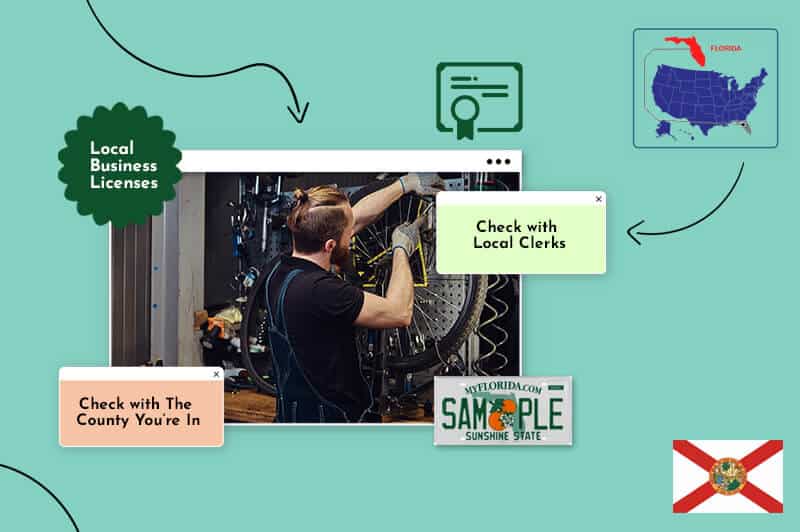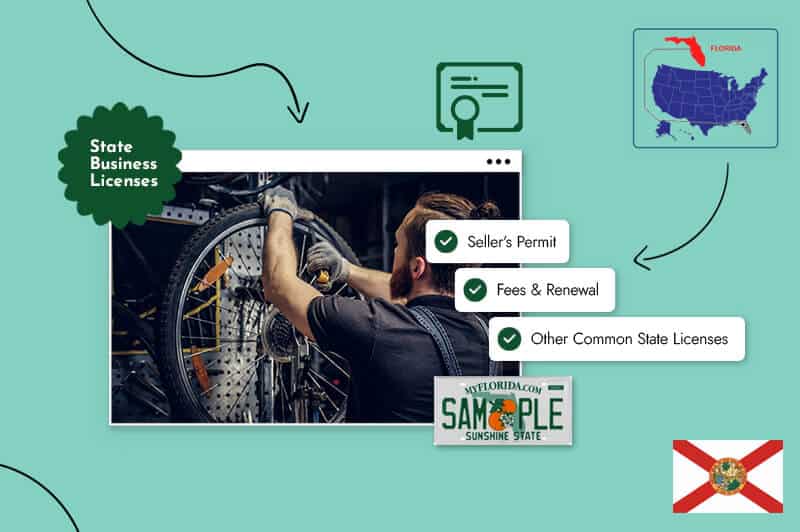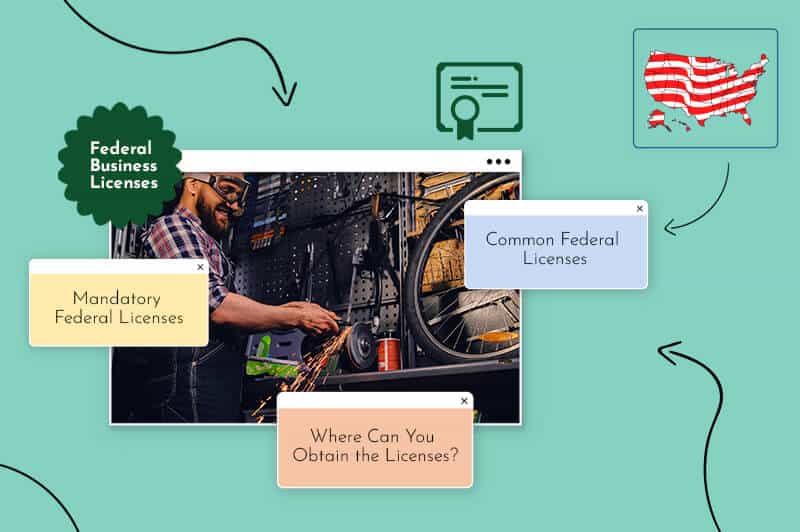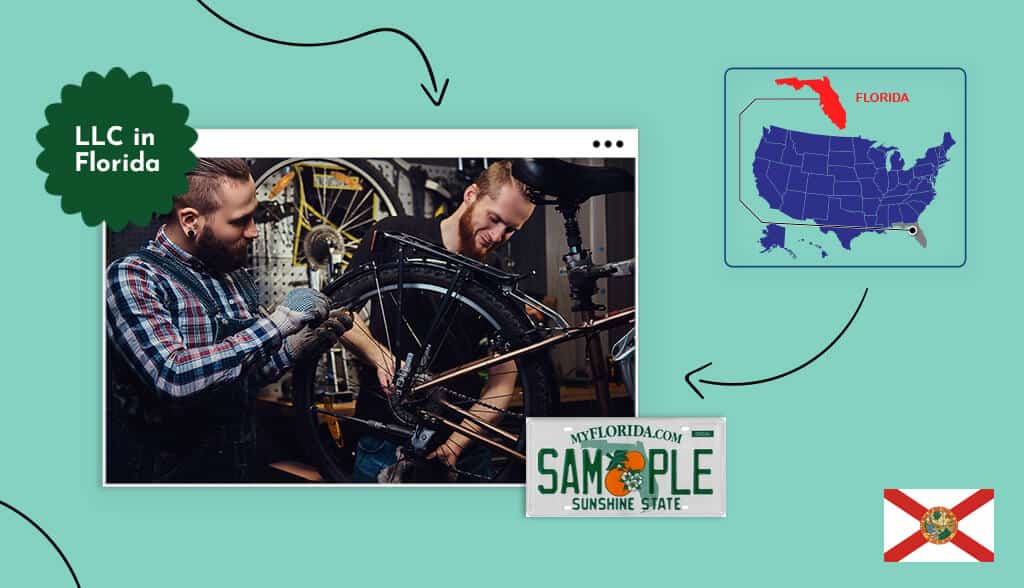After starting a business in Florida, you will want to ensure you get all the licenses and permits you need and meet all other requirements to operate in the state.
Florida does not require a statewide business license. However, certain professionals need a statewide license. All Florida county and local governments require a business to be licensed to operate in their jurisdictions.
What are business licenses and permits?
Government regulations at the state, county, and local levels may require an LLC to have a business license and permits to do business within the area of their jurisdiction.
Permits are different from licenses. Permits focus on enforcing zoning and safety rules. Licenses give you permission to do or use something.
For example, you might need a license to be a hairstylist and a permit to operate a hair salon.
Business licenses
Depending on what you intend to do, you might need specific county or city business licenses. This general county or city business license is a Florida business tax receipt. Any business selling products or services to the public must have one, including home-based businesses.
The Florida business tax receipt is proof of payment. Display it publicly at your business. It is subject to inspection by a county or municipal official, depending on the company’s location.
Permits
You may need the appropriate permits and a zoning clearance to operate your business if you have physical locations. City and county governments have regulations that you must follow to operate within their jurisdictions. They issue permits to go along with any licensing requirements, so understanding how to start an LLC in Florida is an important step before you open your doors.
Here are examples of the types of permits you may need:
- Building permit
- Health permit
- Occupational permit
- Resale permit
- Signage permit
- Tax permit
- Zoning permit
How to register for licenses and permits
Your business may require a statewide license(s) to conduct business in Florida obtained from the Department of Agriculture and Consumer Services.
Your profession may require a statewide license(s) to conduct business in Florida obtained from the Department of Business & Professional Regulation.
You may need a license or permit from the Department of Health or any of the other statewide licensing agencies.
You may also need county and municipal licenses and permits. If your business requires a federal license or permit to operate, you must get those.
Start with searching for the information found on the “Open My Florida Business” website. You will find what you need to know about statewide licenses and links to the Florida counties’ home pages to review the requirements for operating a business in each county.
Next, you will want to check with the municipalities where you plan to operate the business of the LLC to find out about the local requirements for licenses and permits.
Finally, for federal licenses and permits, check the list published by the Small Business Administration to see if any of your business activities require a federal license or permit.
What happens if I fail to obtain a license?
Operating an unlicensed business in Florida is a first-degree misdemeanor. This crime is punishable by up to one year in jail and a fine of up to $1,000.
Local business licenses and permits

The most common business license needed in Florida is a business operating license, also called a “business tax receipt.”
If you operate your business using a different name than the name you registered for your LLC, you need a Doing Business As (DBA) registration.
There are 67 counties in the state of Florida. Each has its own regulations and ordinances to be followed when operating a business.
Open My Florida Business has a database with links to all the county’s web pages so that business owners may become familiar with the regulations of a county where they plan to conduct business using their Florida LLC.
Check with local clerks
Find out which regulatory entity has jurisdiction over the location where you plan to operate by contacting city hall or the county administration.
Check the county you’re in
For example, if you plan to operate in Miami, you will be in Miami-Dade County’s jurisdiction, including 34 cities, towns, villages, incorporated municipalities, and unincorporated areas.
Here are some local permits you may need to operate your LLC.
Zoning permit
Zoning regulations determine if your LLC can operate in a certain area. The exact location you plan to use must have the zoning needed for the purpose you want.
Getting a zoning permit may be challenging. These permits cover rules about many things such as signs, building appearance, noise, and garbage disposal.
If you attempt to operate without the proper zoning permit, your business may have to stop, and you might be subject to fines or criminal prosecution.
Health permit
If you plan to do anything with food at your business location, you will need a health permit. This type of permit includes storage, shipping, preparation, and serving of food. You will be subject to frequent health inspections to ensure your business meets hygienic standards.
Building permit
If you plan to renovate the building or make any structural changes, you will need to get a building permit. The type of permit depends on the plans you have.
Environmental permits
You may face the need for an Environmental Impact Report to get an environmental permit if your business has any potential to negatively affect the area in regards to water or air quality and waste.
State business licenses

You may need more than one type of Florida statewide license to operate your LLC’s business. If you are unsure what licenses you may need, conduct additional research using the Sunbiz website.
Seller’s permit
Any business in Florida that sells or leases tangible property must obtain a seller’s permit, also called a Florida Annual Resale Certificate. You can sell things in-store or online and collect sales taxes when selling taxable items with this permit. You may also avoid paying sales taxes on items purchased for resale.
How to obtain a seller’s permit
To get this tax permit, submit a business tax application to the Florida Department of Revenue or make your tax registration application online.
Fees and costs
There is no fee for registering online for a Florida seller’s permit; however, there is a $5 processing fee if applying by mail.
Other common state licenses
Every business in Florida must fill out a Florida Business Tax Form and submit it or register the company online.
The Florida Department of Business & Professional Regulation (DBPR) provides licenses for various professions.
Examples of professions that need a license include:
- Doctors/Dentists/Veterinarians
- Physicians’ Assistants/Healthcare Professionals
- Certified Public Accountants
- Stock Brokers
- Real Estate Agents
- Attorney
- Life Insurance Salespeople
The Florida Department of Agriculture and Consumer Services (DACS) provides licenses for certain types of operations, such as:
- Auto Repair
- Citrus Growers
- Daycare Centers
- Food & Beverage/Restaurants
- Pawn Shops
- Pest Control Services
- Private Investigators
- Salvage Dealers
This list is just a partial list, so check with DACS to understand if your operations need a license.
The Florida Department of Health (FDOH) provides licenses to protect the public safety of Florida residents and visitors.
Suppose your LLC’s operations relate to public health, including medical professionals, therapists, dietitians, nurses, tattoo artists, and similar industries. In that case, you must license your LLC with the Florida Department of Health.
There are other licensing agencies for foster care, group homes, daycare, and insurance agents.
You should check with the State Agency homepages for the types of businesses or facilities you will operate or your activities.
For businesses regulated by Florida, you must also have a local business tax receipt for each place of business. You also need a local business tax receipt for each separate business according to its tax classification, and you operate from the same physical location.
Federal business licenses

Most small businesses in Florida do not need any federal licenses or permits.
Depending on what you plan to do, you may need to obtain a federal license.
Are there mandatory federal licenses?
Here are a few types of businesses that need federal business licenses:
- Agriculture
- Alcohol: sales, serving, distribution, or importing
- Aviation
- Commercial fisheries
- Firearms, ammunition, and explosives
- Fish and wildlife
- Maritime transportation
- Mining and drilling
- Nuclear energy
- Radio and television broadcasting
- Transportation
Common federal business licenses
The Small Business Administration (SBA) has a database that gives information about all the requirements for federal- and state-licensed businesses.
What do I need to file for a license?
For professional licenses, you may need your identification, social security number, fingerprints, and proof of specific qualifications. These requirements depend on the type of license.
Here is what you may need for business licenses:
- Your Employer Identification Number (EIN) that you obtained from the IRS
- Business name or any fictitious name (doing business as)
- A legal, physical business address
- A mailing address (if it is different from the physical business address)
- Business telephone number
- LLC registration information and perhaps a certificate of Good Standing
- Sellers permit number (if applicable)
- The full legal name and address of all business owners, and perhaps a copy of their identification
- The type of business you plan to do
- Number of employees
- Expected annual sales
Conclusion
Getting the right licenses and permits is a key step toward operating your business legally in Florida. While the state does not require a general business license, most companies must obtain a county or city business tax receipt and meet additional state or federal licensing requirements depending on their industry.
If you are just getting started, the first step is to form your LLC in Florida by registering with the Division of Corporations through the Sunbiz website. Once your LLC is established, you can move on to applying for the necessary local, state, and federal licenses or permits to stay compliant. Taking the time to complete each step properly will help you avoid penalties, protect your business, and build a solid foundation for long-term success in Florida.
